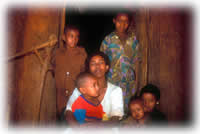 |
 |
||
 |
|||
|
RELATED THEMES education gender population social relationships OTHER LOCAL THEMES BACKGROUND |
family life
Once married, husband and wife are now on a more equal basis and most men seem to approve of their wives' enhanced status as well as the fact that technological improvements have reduced women's domestic burden. Yet economic hardship places more strain on the marriage and can be a cause of conflict. In the past many women tacitly tolerated their husbands keeping concubines in the town so long as there was no noticeable draining away of financial resources from the family. And previously, if the marital relationship had broken down, divorce appears to have been an acceptable course of action since relative prosperity allowed an adequate financial settlement and ensured that a divorced woman would not become impoverished: "[It] was called 'lemon into two' - when the spouses divorced, they divided into two and each took away their share of whatever property they were given by their respective parents when they were first married" (Ethiopia 16). Now, however, financial strain not only leads to more quarrels between spouses, thereby increasing the incidence of marital breakdown, but also makes divorce settlements far more difficult. Some narrators mention that disharmony and quarrelling are more prevalent in the extended as well as the nuclear family: "It is a time of barbarians. In-laws fight each other; mothers and children lack a harmonious relationship between them" (Ethiopia 4). Several narrators say that both men and women now openly take lovers, although a Muslim Qadi (religious leader) says there is no concubinage among Muslims as the practice is forbidden by their religion (Ethiopia 9). In general, narrators' comments on the disruption of marriage and family life contrasts markedly with their overall approval of more equal relations between men and women. quotes about family life"Marriage was a respectable institution then. One asked the parents for their daughter's hand in marriage, but the daughter was not told about it. The wedding feast was lavish, with rams and bullocks being slaughtered and four or five aqmada (large sheepskin bags) of grain used for preparing the feast. In those days lovers had to keep their secrets tightly. If the brother or mother or aunt or uncle hears of such illicit relations they threatened to butcher the man or beat the woman. Premarital or extramarital sex was a taboo. Even the divorced woman has to hide her relations. Now the girl is married not only with her parents' consent, but with her consent too. Besides the couples choose their would-be spouses mostly at school.The boys and girls have gone beyond the control of their parents." "Even if our fathers were unfaithful, they did not have sexual relations with people in the towns. When they went to towns for land-based litigations, they always came back without taking off their trousers. When the youth today migrate to the towns, they are infected by this disease [HIV/AIDS] which they say has been brought from abroad." "Now, too many children are born in a family and the mother cannot feed them well. So, when they nag her for food, she begins to hate them and they leave their homes only to become other persons' servants. One cause of the quarrels between couples is the shortage of food for feeding the children. Finally, the marriage breaks up and everyone migrates." |
|
 The institution of marriage has undergone changes in both social and economic terms. Both the average age of marriage and the age at which young people first have children have changed. In the past, according to one narrator (Ethiopia 2), girls were formally contracted in marriage as young as seven or eight; however, they had no sexual relations until they were at least 15 and strong enough to bear children. Now, parents cannot afford to marry off their children at a young age; on the other hand, sexual relationships are beginning much earlier and young people are making their own choice of marital or sexual partner. Many older narrators express their disapproval of this trend as well as children's lack of respect for their elders; several say that young people no longer listen to or obey their parents.
The institution of marriage has undergone changes in both social and economic terms. Both the average age of marriage and the age at which young people first have children have changed. In the past, according to one narrator (Ethiopia 2), girls were formally contracted in marriage as young as seven or eight; however, they had no sexual relations until they were at least 15 and strong enough to bear children. Now, parents cannot afford to marry off their children at a young age; on the other hand, sexual relationships are beginning much earlier and young people are making their own choice of marital or sexual partner. Many older narrators express their disapproval of this trend as well as children's lack of respect for their elders; several say that young people no longer listen to or obey their parents.